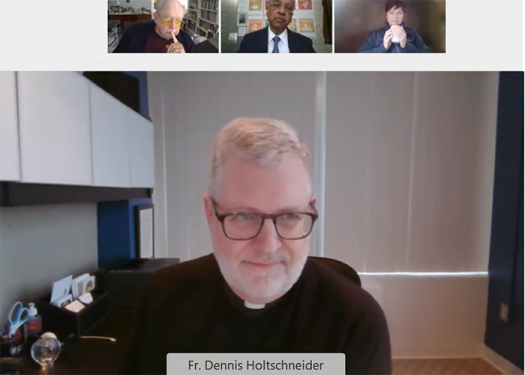
By Michael Rizzo
JAMAICA — “Continued disruption in traditional teaching and learning.”
That was among the predictions voiced by an international group of educators and researchers participating in “The Future of Higher Education,” an online seminar hosted May 3 by the Institute for International Communication at St. John’s University in Jamaica, Queens.
“I’m both excited and terrified of what those changes might be,” said Glenn Gerstner, interim dean of St. John’s Collins College of Professional Studies in his introductory comments.
The headline panelist was Father Dennis Holtschneider, C.M., past president of DePaul University and now president and CEO of the Association of Catholic Colleges and Universities.
He detailed developments he saw as already amplified in higher education because of the pandemic. His list included the closings of smaller colleges, the expansion of online courses — which he said diminishes the differentiation between schools — and how non-educational organizations like IBM, the World Bank, and even some museums are conferring degrees previously offered just by universities.
“Four-year traditional schools are still reading the magazines for rankings and they’re looking at the wrong competitors,” he said. “These are the new competitors.”
Father Holtschneider also spoke of how more and more employers are not requiring four-year college educations for new workers. He mentioned a Google certificate program that takes six months to complete and costs just a few hundred dollars. He said graduates of that program can then be hired by Google or other companies that accept Google’s certification.
“I give this to you today not as the future but as the present that is now picking up speed and steam because of the pandemic.”
Dr. Melissa Labonte, Associate Professor of Political Science at Fordham University, said schools cannot think of simply returning to the way things were before the pandemic.
“It’s going to require even more ingenuity and collaborative thinking of advocacy than the crisis phase demanded of us if we are to truly leverage this moment to strengthen and advance the value of higher education,” she said.
The other panelists in the two-hour event, which was originally scheduled for 90 minutes, added their own perspectives on the challenges educators face and how to overcome them.
Dr. Chantal Line Carpentier, Chief of the United Nations Conference on Trade and Development, cited statistics showing that 1.6 billion learners worldwide have been adversely impacted by the pandemic, due in part to shutdowns and the lack of internet access. Carpentier called for innovative investments in education and a focus on sustainability that reinforces education as the “bedrock for a just, equal, inclusive and peaceful society.”
Päivi Oinonen, who manages the Design Factory Global Network facility at Aalto University in Finland, highlighted programs there where students are connected with businesses in creative ways to foster learning and engage them with companies for new product development.
Dr. Paul Levinson of Fordham’s Communication and Media Studies program told the online audience of more than 40 persons that he’s been teaching remotely since 1985. He said teaching online shouldn’t replace in-person classes, but schools cannot go back to the low levels of remote learning that existed before the pandemic.
“We need to try to make our educational environment hospitable to both kinds of education,” he said. “Live and let live.”
In the final presentation, Professor Yvonne Pratt-Johnson of St. John’s School of Education said students are speaking out more than ever for education systems that suit their lifestyles and not what schools think need to be offered. She called for greater flexibility in the way courses are offered, not only between online and in-person options, but in course duration and through greater interaction between different universities.
As the session drew to a close, the panelists heard questions and comments from attendees. One noted that the levels of administrative processes can slow down changes at large academic institutions. Another spoke of how business leaders remain concerned about the future.
But also posted on the chat screen was a brief entry from one attendee clearly looking ahead when he wrote, “I did not teach online this past year, I look forward to returning to the classroom for the fall semester.”
